Via Robin Good
Get Started for FREE
Sign up with Facebook Sign up with X
I don't have a Facebook or a X account
 Your new post is loading... Your new post is loading...
 Your new post is loading... Your new post is loading...

Maria Persson's curator insight,
March 21, 2014 12:11 AM
If you are considering being a teacher for this and the next generation - take a few tips from this scoop! 
Audrey's curator insight,
March 21, 2014 7:30 PM
Curating is about finding and selecting information in order to learn about a subject. Youngsters can be encouraged to do this pre-school. This motivational 21st century skill can be encouraged at home. with educational games toys and and books which stimulates interest. For example children can learn about science by interacting with Chemistry Lab; Horrible Science - explosive experiments; Newton's Cradle and Science Museum. By the time they get to school they are already full of curiosity and ready to increase their knowledge. Audrey curating for www.homeschoolsource.co.uk 
Monica S Mcfeeters's curator insight,
March 30, 2014 9:27 AM
By Robin Good, Here's a short first-hand report highlighting how an 8th grade social studies class teacher (Terri Inloes) has fully leveraged the content curation potential to let her students dive, discover and make sense of topics (in this case social reform movements) that they had not studied before. All by themselves. Here the steps taken to make this happen: a) By using the Question Formulation Technique, the teacher prepared pairs of photographs representing each of the reform movements, one picture dating back to the late 19th century, and another representing where that social reform movement stands in today’s society. b) After checking out all of the photos, students settled on the pair of pictures that most caught their interest. c) They brainstormed and refined a set of specific questions, and then shared their thinking with the class. e) At this point students planned their research strategies. By using 5 different graphic organizers from the book Q Tasks, by Carol Koechlin and Sandi Zwaan, students were allowed to choose the one that they thought would help them the most in planning their keyword search strategies. f) Students were assigned WordPress blogs and provided basic instructions on how to use them to curate and publish their research work. g) Discovery and real learning kicked in as students proceeded in collaborative groups to research and document their chosen topic. You can see some of the outcomes that this assignment produced right here: General Conclusions http://tmsredvotingrights.d20blogs.org/2014/02/24/conclusion-3/ Voting Rights Inequality http://tmsredvotingrights.d20blogs.org/ Mental Health Treatment Prohibition Acts http://tmsorangeprohibitionacts.d20blogs.org/
A very inspiring example of content curation can be effectively applied in the classroom with impressive results. Highly recommended. 9/10 Thanks to Nancy White of Innovations in Education for participating, writing and reporting about it. Thanks to Robin Good for the fine summary in this insight. The ideas here offer a great classroom challenge to students.{Monica}

Olivier Tabary's curator insight,
November 28, 2014 12:06 PM
Many interesting tools to practice and to discover 
Jamie Mitchell's curator insight,
March 8, 2016 1:04 AM
Amazing resources about places and topics in Geography

Kathy Schrock's curator insight,
January 23, 2014 7:00 PM
Librarians have been doing this for years, but now have many tools to pick from!
Angel Somers's curator insight,
February 2, 2014 1:31 PM
LIbrarians are natural curators! It's what we do, so it makes sense that we should take the initiative to promot curation as a valuable skill for both our colleagues and our students.

YK Chau's curator insight,
January 8, 2013 9:05 PM
Silvia Rosenthal Tolisano has an interesting and highly visual post on collecting vs. curating with Twitter, and on the curation potential Twitter has in store for those involved in education.
She quotes Mike Fisher writing: "Collecting is what kids do when asked to find resources for a particular topic. Usually, it represents the first 3 or 4 hits on a Google search, without meaning, discernment, or connections.
Curating is different. It’s the Critical Thinker’s collection, and involves several nuances (see Figure 1) that separate it as an independent and classroom-worthy task."
Useful. Resourceful. 7/10
Full article: http://langwitches.org/blog/2013/01/03/twitter-as-a-curation-tool/#
~~~~~~~~~~~~~~~~~~~~~~~~~~~~~~ Robin's curated posts hits it on the nail with the distinct differences and although I like the visual aspects of the post, I struggle with referring to Twitter as a curating tool.
It is certainly a critical tool for collecting, researching and having the conversations. I think there is a challenge on how to effectively curate with Twitter. I know many use Storify to do this which is often a re- representationof the tweets.
I am very interested in how Twitter will use Summnify aand Posterous in the field of curation.
As a result, I really likw the distinctions made and the logic the author takes us through. I would perhaps be a little more cautious with referring Twitter as a curation tool.
Useful 6/10 Curated by Shirley Williams.

Monica S Mcfeeters's curator insight,
January 8, 2013 10:03 PM
Silvia Rosenthal Tolisano has an interesting and highly visual post on collecting vs. curating with Twitter, and on the curation potential Twitter has in store for those involved in education.
She quotes Mike Fisher writing: "Collecting is what kids do when asked to find resources for a particular topic. Usually, it represents the first 3 or 4 hits on a Google search, without meaning, discernment, or connections.
Curating is different. It’s the Critical Thinker’s collection, and involves several nuances (see Figure 1) that separate it as an independent and classroom-worthy task."
Useful. Resourceful. 7/10
Full article: http://langwitches.org/blog/2013/01/03/twitter-as-a-curation-tool/#
~~~~~~~~~~~~~~~~~~~~~~~~~~~~~~ Robin's curated posts hits it on the nail with the distinct differences and although I like the visual aspects of the post, I struggle with referring to Twitter as a curating tool.
It is certainly a critical tool for collecting, researching and having the conversations. I think there is a challenge on how to effectively curate with Twitter. I know many use Storify to do this which is often a re- representationof the tweets.
I am very interested in how Twitter will use Summnify aand Posterous in the field of curation.
As a result, I really likw the distinctions made and the logic the author takes us through. I would perhaps be a little more cautious with referring Twitter as a curation tool.
Useful 6/10 Curated by Shirley Williams.

Baptiste Morch's curator insight,
January 9, 2013 7:49 AM
Silvia Rosenthal Tolisano has an interesting and highly visual post on collecting vs. curating with Twitter, and on the curation potential Twitter has in store for those involved in education.
She quotes Mike Fisher writing: "Collecting is what kids do when asked to find resources for a particular topic. Usually, it represents the first 3 or 4 hits on a Google search, without meaning, discernment, or connections.
Curating is different. It’s the Critical Thinker’s collection, and involves several nuances (see Figure 1) that separate it as an independent and classroom-worthy task."
Useful. Resourceful. 7/10
Full article: http://langwitches.org/blog/2013/01/03/twitter-as-a-curation-tool/#

Giuseppe Mauriello's comment,
August 9, 2012 9:41 AM
Thanks Robin!
I scooped your article one hour ago! :-) 
Ken Morrison's comment,
August 10, 2012 4:15 AM
Thank you for the rescoop. If your aren't following him already, I highly suggest following Robin Good's topics on here. There is some great information about wise curation there. Good luck to you :)
Ken 
Ken Morrison's comment,
August 17, 2012 8:26 AM
Thank you for the rescoop. I appreciate your scoop.it sites. Your 4th Era one was one of the first that I began following.
Ken |

Christoph Meier's curator insight,
August 11, 2014 4:20 AM
Hilfreicher Übersichtsartikel mit Links zu verschiedenen Beiträgen in peer reviewed journals.
Mark Monsen's curator insight,
May 6, 2015 11:21 PM
All about curation, some great educational models

Diana Juárez's curator insight,
April 26, 2015 1:27 PM
La curación como herramienta pedagógica para propiciar el pensamiento crítico en la educación. 
Bárbara Mónica Pérez Moo's curator insight,
August 12, 2015 9:16 AM
Habilidades digitales y pensamiento crítico.
Sample Student's curator insight,
May 5, 2015 10:14 PM
We often ask our students to create annotated bibliographies, and this focuses on their capacity to evaluate and make decisions about the validity, reliability and relevance of sources they have found. using Scoop.it, we can ask them to do much the same thing, but they will publish their ideas for an audience, and will also be able to provide and use peer feedback to enhance and tighten up their thinking. This is relevant to any curriculum area. Of course it is dependent on schools being able to access any social media, but rather than thinking about what is impossible, perhaps we could start thinking about what is possible and lobbying for change.
Sample Student's curator insight,
May 5, 2015 10:18 PM
We often ask our students to create annotated bibliographies, and this focuses on their capacity to evaluate and make decisions about the validity, reliability and relevance of sources they have found. Using Scoop.it, we can ask them to do much the same thing. But they will publish their ideas for an audience, and will also be able to provide and use peer feedback to enhance and tighten up their thinking. This is relevant to any age, and any curriculum area. Of course it is dependent on schools being able to access social media. But rather than thinking about what is impossible, perhaps we should start thinking about what is possible, and lobbying for change. Could you use a Scoop.it collection as an assessment task? |




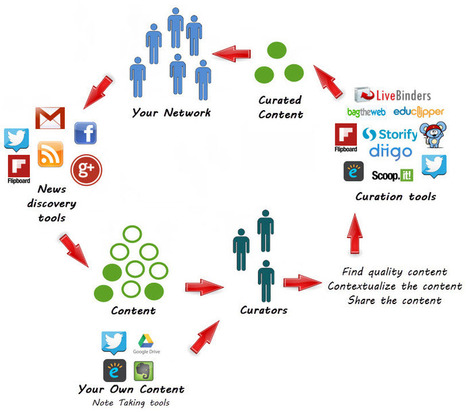


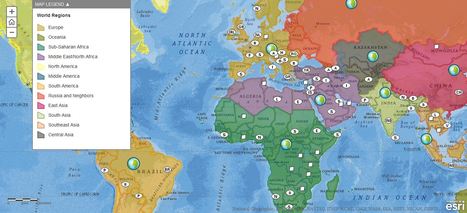



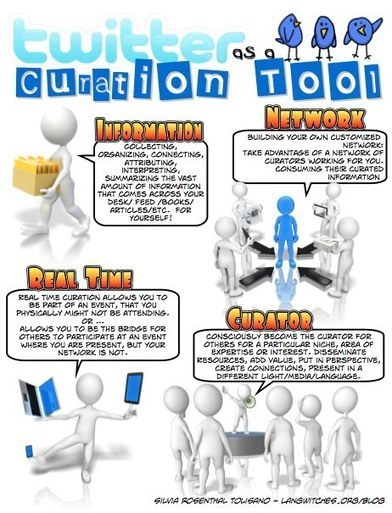
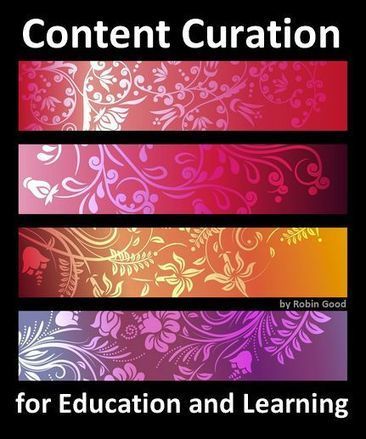

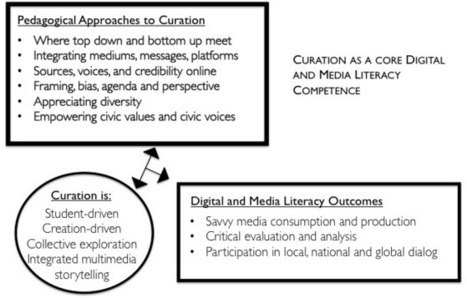

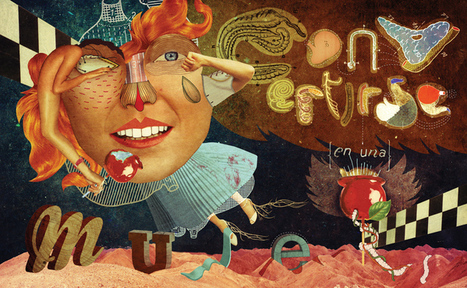

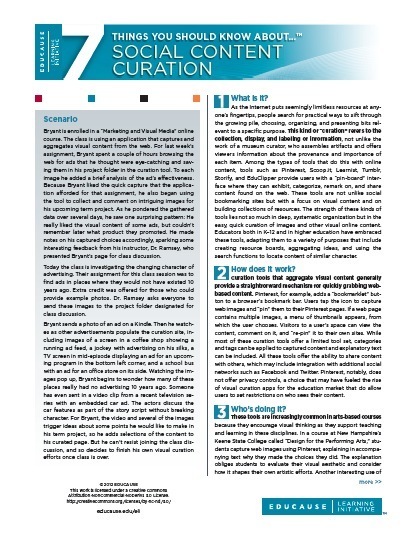





An absolutely significant skill in any research or investigation, for educators and learners in the digital age - the curation of content- with a clear focus or question in mind, the capacity to target a search field, sift through, reflect on and make decisions about the most suitable resource or evidence to use. What a great learning experience.
Forstå og komme i gang med kurator tjenester.